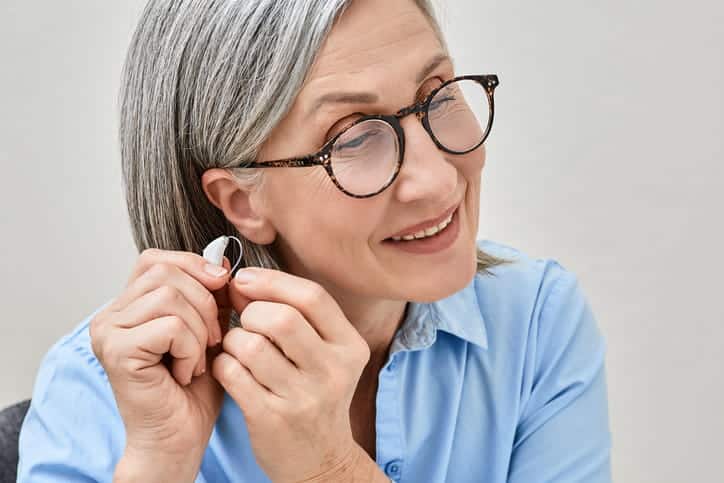It is normal to experience vision and hearing issues as we age. Addressing these issues is vital to helping reduce the risks of falls and other accidents. Whether you are concerned about your parents or want to know what you can do for yourself, reviewing these elderly care tips for vision and hearing can be beneficial.

Contact Haven Health to learn about our assisted living programs in Arizona.
How Can I Help My Elderly Family Member With Hearing Issues?
It can be difficult for some people to adjust to reduced hearing. However, there are plenty of things that can be done to accommodate individuals with hearing loss. Some elderly hearing care tips to help yourself or a family member include:
- Get an annual hearing test: Identifying hearing changes and any hearing loss is important. As part of one’s annual wellness checkup, annual tests can help determine when potential hearing problems could be present.
- Get hearing aids: When hearing loss is mild or moderate, hearing aids can help immensely. These tiny devices help make it easier to hear.
- Make appropriate living accommodation changes: For more significant hearing loss, consider making different changes at home, such as turning on closed captioning on TV shows and installing lighted doorbells and visual smoke detectors. It is also beneficial to turn up the volume on smartphones.
- See an occupational therapist: Occupational therapy sessions can help elderly people with hearing loss. They can learn how to accomplish what they enjoy and want to do while overcoming their reduced hearing.
How Can I Help My Elderly Family Member With Vision Issues?
Several vision issues can develop as we age. Normal vision loss is expected as part of the aging process. However, other vision conditions can also develop, such as cataracts, glaucoma, diabetic retinopathy, and age-related macular degeneration. Some useful elderly vision care tips that could be helpful are:
- Have your vision checked annually: Since vision changes can occur much faster as we age, it is important to get your vision checked annually. Doing so can help identify potential vision problems and treat them sooner before they worsen.
- Visit an ophthalmologist: Consulting with an ophthalmologist is highly recommended for medical issues related to vision loss. They can make recommendations and provide treatment to correct or slow down vision loss when it is incurable.
- Get cataract surgery: Everyone will get cataracts at some point in their life. This type of vision loss is easily correctable with cataract surgery.
- Wear glasses as prescribed: It is essential to wear glasses as prescribed and when needed to help aid with vision loss.
- Be aware of differences in vision when wearing bifocals: Getting used to bifocals can take some adjustment because part of the vision can sometimes seem blurry. Taking off bifocals when walking up or down stairs, over curbs, or other obstacles that could result in a fall when you are not used to wearing them can be a good idea.
- Turn on accessibility features on electronics: TVs, computers, tablets, and smartphones all have accessibility features that can make the print and images bigger or can be used to verbally communicate what is on the screen.
- Make sure living spaces have sufficient lighting: To avoid tripping, falling, or running into furniture, there should be plenty of lighting available. Make sure it is easy to find light switches when you need to turn lights on and off in the dark. Get a night light for the bedroom and bathroom to make it easier to see when getting out of bed or going into the bathroom. You should also consider smart bulbs that can be synced with digital assistants to turn lights on and off using verbal commands.
- Get occupational therapy: Occupational therapists can also assist the elderly with vision loss and teach them new ways of doing different things with reduced vision.
What Can I Do To Help if My Loved One Is in an Assisted Living Facility?
If your elderly loved one is in an assisted living facility or skilled nursing facility, you should work with their care team to ensure the appropriate accommodations are made for their hearing or vision loss. Healthcare providers in a nursing facility or assisted living facility know how to work with your elderly loved one and teach them different elderly care tips.
Related: Six Mental Health Tips for Seniors
Find Assisted Living and Skilled Nursing Facilities in Arizona Today
When searching for an assisted living facility or skilled nursing facility for yourself or your elderly parents, look no further than Haven Health in Arizona. We have several different locations that provide exceptional care and support by our compassionate healthcare professionals. We also offer a wide range of other services, including occupational therapy, physical therapy, and complex wound care.
Contact Haven Health to learn more about our care facilities today.
Sources:
Care for Your Vision and Hearing: 5 Ways to Lower Falls Risk. (2023).